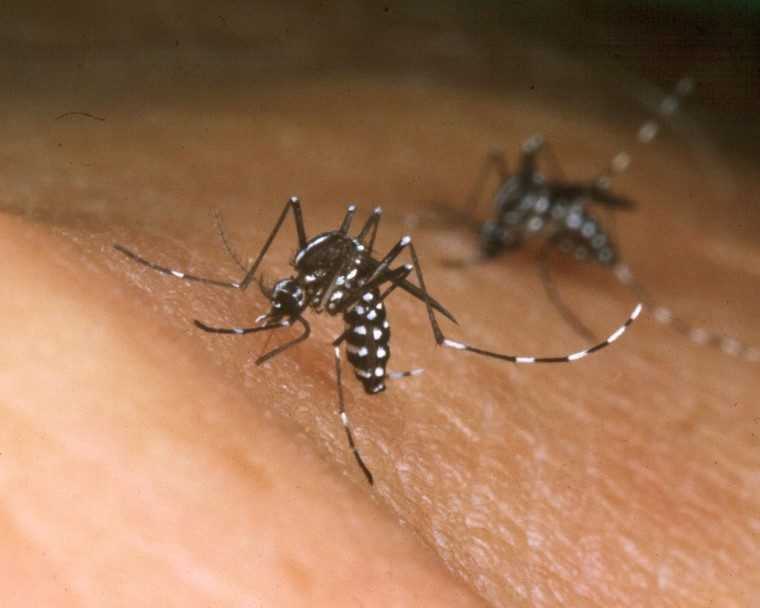Zika virus, suspected of causing severe birth defects in Brazil, has been diagnosed in a traveler in Houston.
Officials in Harris County confirmed the case Monday. It’s not the first time a tourist has carried Zika to the U.S., the Centers for Disease Control and Prevention says. And Zika is not poised to spread across the country just yet, but some experts are worried.
Scientists are working to find out whether the virus really is causing the birth defect, and how it might be doing it.

“I am really worried about Zika,” says Dr. Peter Hotez, dean of the National School of Tropical Medicine at Baylor College of Medicine and director of the Texas Children's Hospital Center for Vaccine Development.
Although a tropical virus like Zika isn’t likely to spread widely across the more temperate parts of the U.S., it can spread anywhere that its distant relative, dengue virus, can spread. It's carried by the Aedes aegyptus mosquito, which only lives in tropical regions, but the Asian tiger mosquito, Aedes albopictus, which shows up much farther north in the summer, can also carry it.
Hotez says Houston and similar cities such as New Orleans have good conditions for the spread of Zika, a once-obscure infection that even many infectious disease specialists had never heard of.
“We have both species of mosquito that can transmit the virus. There’s the right level of poverty and the tropical climate.”
They include wet lowlands where mosquitoes can breed, warm temperatures, and poverty.
“I am quite worried about Zika taking off on the Gulf coast,” Hotez told NBC News.
“We have both species of mosquito that can transmit the virus. There’s the right level of poverty and the tropical climate.”
Zika has taken off with a vengeance in Brazil, and spread across Latin America as far north as Mexico. Health officials are not doing a precise count — the virus is not easy to test for and it causes very mild symptoms in most people. But hundreds of thousands of people have been infected.
The more people get infected, the more likely the virus is to spread. Zika is only known to infect people, so mosquitoes have to bite someone who is infected before they can spread it to someone else with their bites.
The occasional tourist bringing Zika back to the U.S. is unlikely to cause an outbreak. What officials need to look out for is evidence someone caught the virus locally. Dengue caused very small outbreaks in Texas in recent years, and Hawaii is just recovering from a larger dengue outbreak that infected about 200 people and that almost certainly was started by an infected tourist.
Hotez says cities such as Houston cannot afford to wait.
“The problem with it is we have to act now,” he said. “This is such an unusual virus. It tends to produce low-level symptoms. You won’t know you had a Zika outbreak until nine months later, when babies start being born with microcephaly.”
At first health officials were skeptical that Zika was causing the birth defect, called microcephaly — an often deadly condition in which babies are born with smaller than normal brains and heads. But the number of cases has now reached 4,000, compared to an average of 150 or so a year in previous years.
But experts reported last week they’d found genetic material from the virus in amniotic fluid of mothers with two babies with microcephaly. Dr. Mauricio Lacerda Nogueira, a virologist at Brazils Sao Jose de Rio Preto medical school, says he’s working to find more such evidence that it’s Zika and not something else causing the surge in cases.
"Pregnant women in general, and particularly those who develop symptoms of Zika virus infection, should be closely monitored by health providers.”
There's no vaccine and no treatment for Zika virus. It's the second exotic virus to spread across Latin America is such a short time. Chikungunya, also carried by mosquitoes, is now found across the region and is frequently carried to the U.S. by travelers.
In the meantime, the Pan American Health Organization is warning everyone traveling in warmer areas of the Americans to take care to avoid mosquito bites. Pregnant women need to take special care, PAHO says.
“Research is currently under way on possible mother-to-child transmission of the virus and its effects on babies. Pregnant women in general, and particularly those who develop symptoms of Zika virus infection, should be closely monitored by health providers,” PAHO, part of the World Health Organization, says in a update released this week.
PAHO says only one in four people infected with Zika develops symptoms. They include a low level fever, rash, joint pain and conjunctivitis.
